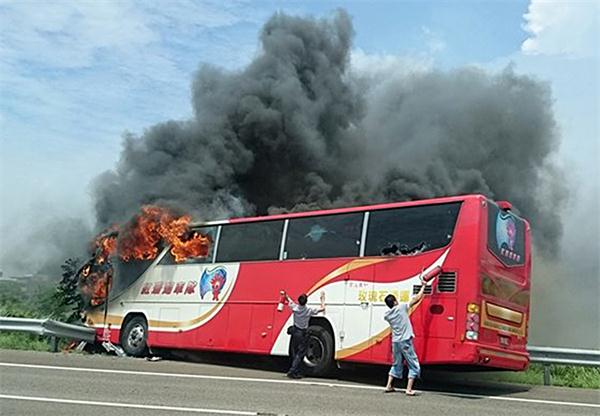Bus fire a sad beginning of humanity?
Updated: 2016-07-20 14:02
By Shih Chih-yu(China Daily)
|
|||||||||
 |
|
Tour bus catches fire on highway to the Taiwan Taoyuan International Airport in Taiwan, July 19, 2016. Twenty-six people died in this accident.[Photo by China Times/Asianewsphoto] |
Does it have to take 26 lives to force Taiwan authorities to view people from the Chinese mainland from the perspective of humanity? For more than two decades, the public narrative in Taiwan has been one of reluctance to treat compatriots from across the Taiwan Straits as real subjects of the "Rights of Man”.
The deaths of 24 tourists from the mainland (and the bus driver and tour guide who were Taiwan residents) in a bus accident in Taiwan on July 19 calls for an examination into the rights of the victims. To begin with, we'd like to know how the fire started in the bus before it hit the expressway barrier in Taoyuan county, south of Taipei.
For the first time, local media outlets thoroughly reviewed an accident in which mainland compatriots were victims. Concerns for humanity are revealing in the reports in general, tracking the footsteps of the victims in their earlier itinerary. Shock and sorrow were evident on TV screens.
These reports are in contrast to the noticeable absence in Taiwan of anything related to the rights of people from the mainland. In 1994, 24 tourists from Taiwan were robbed and burned to death in Zhejiang province. Media outlets in Taiwan deliberately avoided reference to the eight mainland victims in order to portray the incident as one of mainland residents murdering their Taiwan compatriots.
In the same year, 10 mainland fishermen drowned while trying to swim ashore in Taiwan to escape an approaching typhoon. They would not have died if the local authorities had not banned their ship from seeking shelter despite its owners being Taiwan residents.
In 1999, the captain of a Taiwan fishing vessel killed 15 mainland crew members. The authorities claimed he was in a psychotic state. There was no explanation, however, how a psychotic was able to single out only mainland victims. Was that the result of stereotyping of mainland compatriots by the Taiwan authorities among the island's residents?
In this century, the most notorious rights issues have been the refusal to accept mainland spouses as Taiwan residents after the same probation period that all foreign spouses get and the refusal to provide health insurance to mainland students that students from other places are entitled to.
These ugly records never seem to bother the Taiwan authorities, as the popular way of distinguishing Taiwan residents from their mainland compatriots is still that the former enjoy liberal rights not available to the latter.
Pro-independence forces in Taiwan are against accepting their mainland compatriots as subjects of rights. There has been a registered anxiety in Taiwan since the Democratic Progressive Party won the leadership election earlier this year. And the DPP has not disappointed its supporters, for it has allowed all kinds of negative campaigns on cross-Straits relations.
A powerful undercurrent in Taiwan is the longing for a return to humanity. Hopefully, the deaths of 26 people will serve as a sad beginning of this return.
The author is a political scientist affiliated with a Taiwan-based university.
Related Stories
Senior NE China officials receive Taiwan youth delegation 2016-07-20 13:03
Jilin increasing business contacts with Taiwan 2016-07-20 12:55
What caused the Taiwan bus fire? 2016-07-20 10:26
Taiwan bus fire kills 24 from mainland 2016-07-20 07:45
Today's Top News
Brussels police: Bomb aleart was false alarm
May takes center stage in parliament's box-office show
Turkey's failed coup to consolidate Erdogan's power
Republican Party nominates Trump for president
IMF to cut global growth forecasts after Brexit vote
IS: Refugee attacker in Germany one of its fighters
Did Melania Trump plagiarize from Michelle Obama?
26 die after tour bus catches fire in Taiwan
Hot Topics
Lunar probe , China growth forecasts, Emission rules get tougher, China seen through 'colored lens', International board,
Editor's Picks

|

|

|

|

|

|







